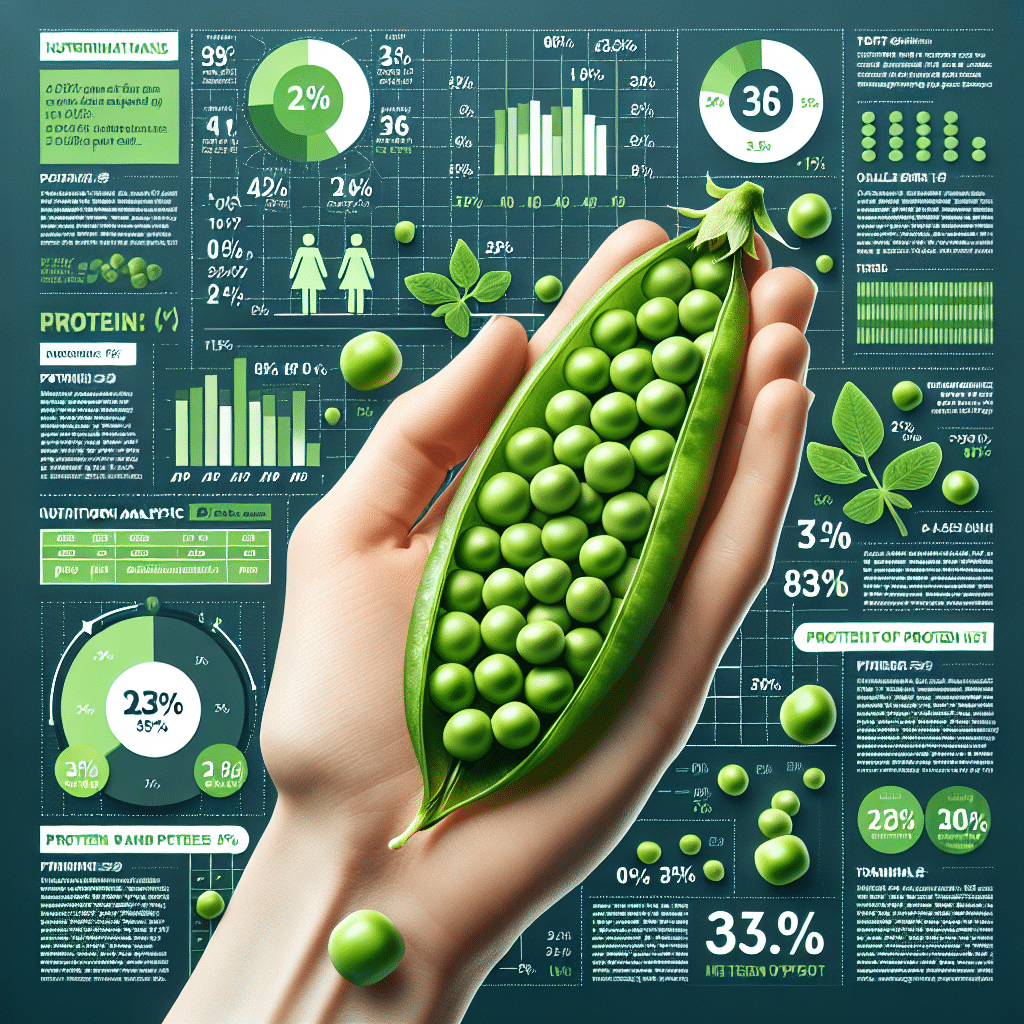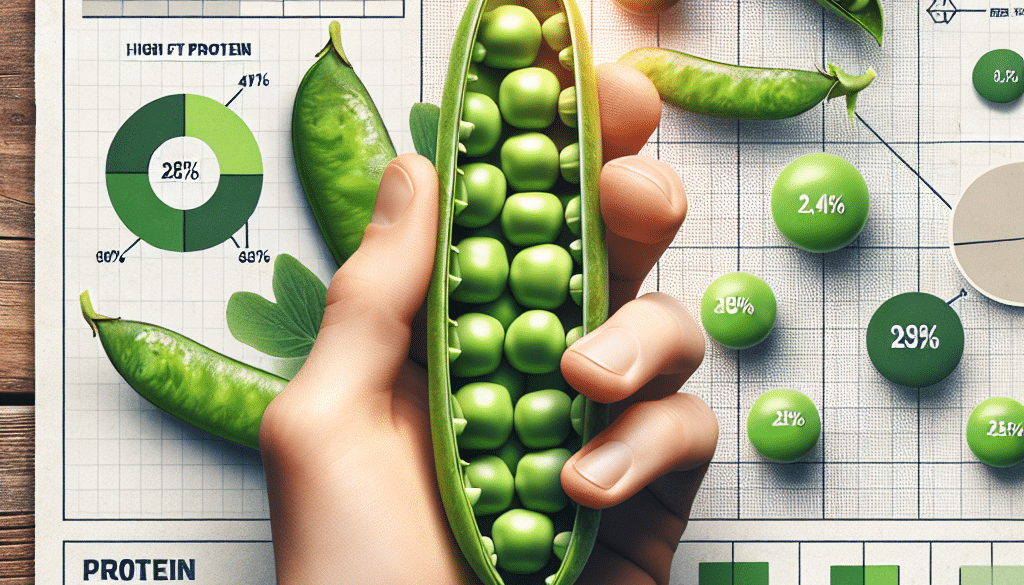Are Peas High in Protein: Nutritional Analysis
-
Table of Contents
- Are Peas High in Protein: Nutritional Analysis
- The Nutritional Profile of Peas
- Protein Content
- Carbohydrates and Fiber
- Fat Content
- Vitamins and Minerals
- The Health Benefits of Peas
- 1. Weight Management
- 2. Heart Health
- 3. Blood Sugar Control
- 4. Digestive Health
- 5. Antioxidant Properties
- How to Incorporate Peas into Your Diet
- Summary
- About ETprotein
Are Peas High in Protein: Nutritional Analysis

When it comes to protein-rich foods, meat and dairy products often come to mind. However, there is a growing interest in plant-based protein sources, and peas have emerged as a popular choice. Peas are not only delicious and versatile, but they also offer a range of health benefits. In this article, we will explore the nutritional content of peas and answer the question: Are peas high in protein?
The Nutritional Profile of Peas
Peas, scientifically known as Pisum sativum, are a type of legume that belong to the Fabaceae family. They are widely consumed around the world and are available in various forms, including fresh, frozen, canned, and dried.
Peas are a nutrient-dense food, meaning they provide a high amount of nutrients relative to their calorie content. They are an excellent source of vitamins, minerals, and dietary fiber. Let’s take a closer look at the nutritional composition of peas:
Protein Content
Peas are indeed a good source of protein, especially when compared to other vegetables. On average, peas contain about 5-6 grams of protein per 100 grams. While this may not seem like a significant amount, it is important to consider that peas are typically consumed in larger quantities, making them a valuable protein source.
Furthermore, peas are considered a complete protein, meaning they provide all nine essential amino acids that the body needs but cannot produce on its own. This makes them an excellent choice for individuals following a vegetarian or vegan diet.
Carbohydrates and Fiber
Peas are relatively low in carbohydrates, making them suitable for individuals who are watching their carb intake. They contain about 14-16 grams of carbohydrates per 100 grams. Additionally, peas are an excellent source of dietary fiber, with around 5-6 grams per 100 grams. Fiber is essential for maintaining a healthy digestive system and can help regulate blood sugar levels and promote satiety.
Fat Content
Peas are low in fat, with only about 0.4-0.6 grams of fat per 100 grams. The fat content in peas is primarily unsaturated fats, which are considered heart-healthy fats. These fats can help reduce the risk of heart disease and improve overall cardiovascular health.
Vitamins and Minerals
Peas are packed with essential vitamins and minerals that contribute to overall health and well-being. They are particularly rich in vitamin K, vitamin C, vitamin A, and several B vitamins, including folate. Peas also contain minerals such as iron, magnesium, potassium, and zinc.
The Health Benefits of Peas
Consuming peas regularly can offer a range of health benefits. Here are some of the key advantages:
1. Weight Management
Peas are low in calories and high in fiber, making them an excellent food for weight management. The fiber content in peas helps promote feelings of fullness and can reduce overall calorie intake.
2. Heart Health
The high fiber and low-fat content in peas contribute to heart health. The soluble fiber in peas can help lower cholesterol levels, while the unsaturated fats can reduce the risk of heart disease.
3. Blood Sugar Control
Peas have a low glycemic index, meaning they cause a slow and steady rise in blood sugar levels. This makes them suitable for individuals with diabetes or those looking to manage their blood sugar levels.
4. Digestive Health
The high fiber content in peas promotes a healthy digestive system by preventing constipation and promoting regular bowel movements. Additionally, the fiber acts as a prebiotic, providing fuel for beneficial gut bacteria.
5. Antioxidant Properties
Peas are rich in antioxidants, including flavonoids and carotenoids, which help protect the body against oxidative stress and reduce the risk of chronic diseases such as cancer and heart disease.
How to Incorporate Peas into Your Diet
There are numerous ways to enjoy the nutritional benefits of peas. Here are some ideas:
- Add peas to salads for an extra burst of flavor and nutrition.
- Include peas in stir-fries or sautés for a colorful and nutritious addition.
- Make a delicious pea soup by blending cooked peas with vegetable broth and seasonings.
- Use peas as a topping for pizzas or in pasta dishes.
- Enjoy peas as a side dish by steaming or boiling them and adding a sprinkle of salt and pepper.
With their versatility and nutritional benefits, peas can be easily incorporated into a variety of dishes, adding both flavor and nutrition.
Summary
Peas are a nutritious and protein-rich food that offers a range of health benefits. They are a good source of protein, fiber, vitamins, and minerals, making them an excellent addition to a balanced diet. Peas can contribute to weight management, heart health, blood sugar control, digestive health, and provide antioxidant protection. With their versatility, peas can be enjoyed in various dishes, allowing you to reap their nutritional benefits in a delicious way.
About ETprotein
ETprotein, a reputable protein Chinese factory manufacturer and supplier, is renowned for producing, stocking, exporting, and delivering the highest quality organic bulk vegan protein and plant proteins. They include Organic rice protein, clear rice protein, pea protein, clear pea protein, pumpkin seed protein, sunflower seed protein, mung bean protein, etc. Our offerings, characterized by a neutral taste, non-GMO, allergen-free attributes, cater to a diverse range of industries. We serve nutraceutical, pharmaceutical, cosmeceutical, veterinary, as well as food and beverage finished product distributors, traders, and manufacturers across Europe, USA, Canada, Australia, Thailand, Japan, Korea, Brazil, and Chile, among others.
Our specialization includes exporting and delivering tailor-made protein powder and finished nutritional supplements. Our extensive product range covers sectors like Food and Beverage, Sports Nutrition, Weight Management, Dietary Supplements, Health and Wellness Products, and Infant Formula, ensuring comprehensive solutions to meet all your protein needs.
As a trusted company by leading global food and beverage brands and Fortune 500 companies, ETprotein reinforces China’s reputation in the global arena. For more information or to sample our products, please contact us and email sales(at)ETprotein.com today.














